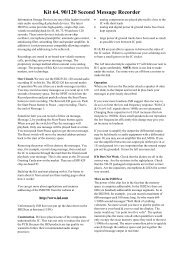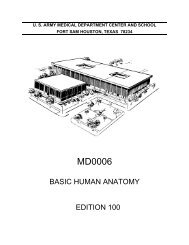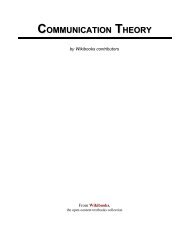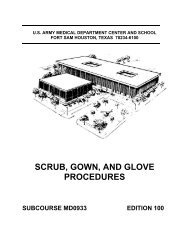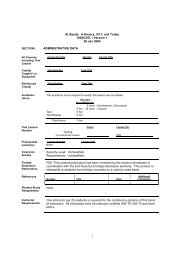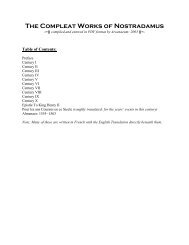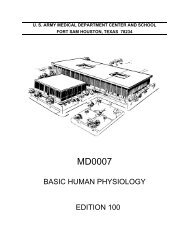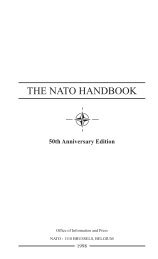US Army mountaineering techniques (basic)
US Army mountaineering techniques (basic)
US Army mountaineering techniques (basic)
Create successful ePaper yourself
Turn your PDF publications into a flip-book with our unique Google optimized e-Paper software.
amino compositions. As a daily protein requirement, the minimum is 8 ounces (227<br />
grams) for a 154-pound (70-kg) man. Protein requires water for digestion and may<br />
facilitate dehydration.<br />
Fats and oils are the most concentrated form of food energy. Main sources of fats and oils<br />
are meat, nuts, butter, eggs, milk, and cheese. Fats require more water and oxygen, and<br />
are harder to digest at higher altitudes.<br />
Carbohydrates are an important source of calories, and can be found in the most<br />
important energy-producing cycles in the body's cells. If the intake exceeds energy needs,<br />
moderate amounts are stored in the muscles and liver; larger amounts are converted into<br />
fat and stored. The most useful sources of carbohydrates are foods such as unrefined<br />
grains, vegetables, and fruits.<br />
There are two groups of vitamins. They are distinguished by their ability to dissolve in<br />
either fat or water. Fat-soluble vitamins include A, D, E, and K; water-soluble vitamins<br />
are B, and C, which are found in cereals, vegetables, fruits, and meats. It is necessary that<br />
you maintain a proper and well-balanced diet which provides all of the required vitamins,<br />
including fat- and water-soluble vitamins. If a deployment is to exceed 10 days, you<br />
should consider taking vitamin supplements to prevent the occurrence of an improper and<br />
unbalanced diet.<br />
Mineral elements can be divided into two groups: those needed in the diet in amounts of<br />
100 milligrams or more a day such as calcium, phosphorous, and magnesium; and trace<br />
elements needed in amounts of only a few milligrams a day such as iodine, iron, and zinc.<br />
Required minerals are contained in a balanced diet of meats, vegetables, and fruits.<br />
A balanced diet containing adequate amounts of vitamins and minerals ensures an<br />
efficient metabolism, and will promote the high level of energy needed to conduct<br />
daily activities in mountainous operations.<br />
Depending on you, the efficiency of your body to work above the basal metabolism may<br />
vary from 20 to 40 percent. Over 50 percent of caloric intake is released as heat and is not<br />
available when you work; about 4,500 calories are expended for strenuous work and<br />
3,500 calories for garrison activity. Perspiration causes excessive bodily heat loss. Your<br />
metabolism may not provide enough heat during inactive periods in cold weather,<br />
initiating the "internal thermostat" and causing the muscles to shiver. This releases heat<br />
and requires burn up of energy; up to 220 calories per hour is estimated for a 100-pound<br />
man.



